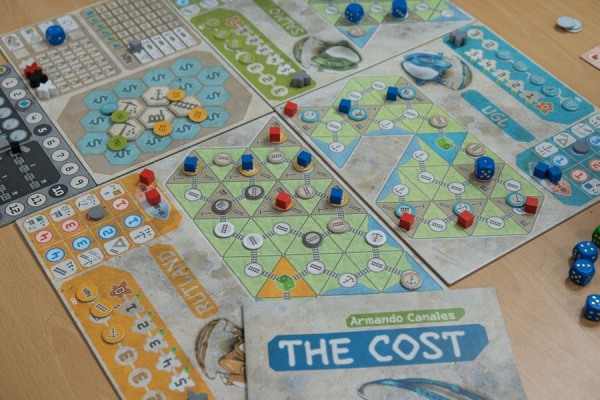Death arrives in an unassuming beige box. There’s a picture of a filter mask on the front and a legend: The Cost. Inside, more beige, more masks and a mixture of four-player colours and four country colours. Punching the boards and tokens into the box, the only hint of what’s to come is the coffin icons at the bottom of each player board.
At first, death takes the guise of a fairly heavy economic euro game. Each country has a demand track, a series of events for things like building rails or ports, and its own distinct geography of triangles. On your turn you choose a country, resolve the event token and place it on a peculiar action selection grid, overlapping three hexes. You get the actions on those hexes, and that junction is blocked for the rest of the game.
Our goal is to profit from the asbestos industry. An easy way to make money is to build rails or ports, try to get priority shipping, and charge players for using your transport network. Bigger money can be made by mining asbestos and transporting it for sale. The biggest reward requires the hardest effort: taking mined ore, refining it and selling that. There other factors to consider, such as exchange rates and the political climate in each country.
While trying to get our heads around this complex network of cause and effect, we almost miss the central point of the game. When we mine or refine asbestos, we face a stark choice. The more workers you assign to these tasks, the more product you get out, but the more expensive it is to perform the action. Unless, like real-world industry, you choose to do so without safety precaution. In that case, you pay a different cost: the death of a worker, who goes into the coffin icon, an eternal reminder of your murderous negligence.
When I explain this, I want it to be a moment. A pause when the players suck their teeth and nod silently in appreciation of the horrors of capitalism. But there’s so much going on in the rules and those first few turns that it doesn’t happen. I try to do the right thing and pay for the safety procedures. Other players do not and walk away with a fatter profit. What they don’t yet realise is that the spectres of their dead will come to haunt them.
It’s not until later in the game that the cost of The Cost comes home. Each death reduces demand in that country as the real-world effects of asbestos are realised. It also makes it harder for a player to change tack, as dead workers increase the cost of implementing safety procedures. It’s the best kind of emergent theme, simple feedback loops that have the expected real-world impact on the game state. As the bodies pile up in the coffins, mouths begin to drop open in horror.
As the game goes on, my attempt at playing safe begins to pay dividends. Having scraped along on a shoestring for the first few turns, I’m able to reap the rewards of continued high demand in the country I’ve focussed my operations in. It’s not been easy: The Cost is a deep, difficult game with a lot of moving parts. Essentially, my reward for working harder in the early game is a clean conscience.

Other players now want a piece of my market, but it’s too late. To get their dirty asbestos to where I’m based they have to use my transport infrastructure. This is not a heads-down game of silently contemplating one’s own play mat. As the four turns draw to a close, we’re still jockeying for the best transport routes and rights. Still trying to undermine exchange rates favourable to our opponents. Still worrying about how many workers we can afford to save.
At the final reckoning, the body count doesn’t matter. Only the dollars do. And my attempt at playing a decent employer, while viable, has not paid off. Yet I’m left with a sour taste due to more than the loss. I might have kept my employees safe, but the game says nothing about my customers. All the houses and workplaces I’ve infiltrated with carcinogens to make a quick buck. It’s a distinctly uncomfortable feeling which, I imagine, is exactly the point.
Although The Cost differentiates itself with morals, the game mechanics at its core are good enough to make us want to try it again. Its interlocking dance of trade and transportation features steps from a number of well-known titles. The railway and port aspects are like the Steam family. Pushing mines and mills into the mix makes it like Brass. Although it has no shares to sell, the market mechanics are a little like Power Grid. While complex, the mechanics fit together like cogwork, with little that feels superfluous.
This time, I focus on profit over people. It’s a decision that feels easier than it should, made more out of interest than integrity. There’s a slight frisson of guilt as I place the meeple in its coffin, but not the nauseous impact of my first mass bombing in Labyrinth. Again, though, as the bodies pile up the emotions intensify. And it isn’t the get out of jail free card I’d hoped. Plummeting demand brings with it a whole new set of problems to solve. I don’t solve them and end up defeated by the game’s weight.
Putting moral choices in the hands of the players is a bold move, but one that can backfire. It’s up to the individual as to whether they want to engage with it or not. Even games that exist solely to provoke an ethical reaction, such as Brenda Romero’s Train, won’t work for an unethical player. The Cost haunts me for a few days because I chose to empathise. Those who choose not to are free to enjoy it as the fine economic game it is. And as they do so, they won’t realise they’re being excoriated as exactly the sort of people who were happy to profit from the asbestos industry in real life.
 Games
Games How to resolve AdBlock issue?
How to resolve AdBlock issue? 




















